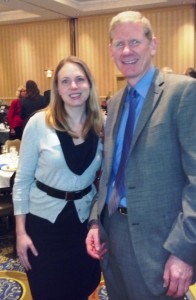To say that the stars appear to be aligning over New Hampshire wouldn’t give due credit to the long, hard work of many energy efficiency proponents in the Granite State. But as an advocate who has spent a good deal of time and thought on how to bring the state’s policies and funding levels in line with neighboring states, I have to say that I’m optimistic.
New Hampshire has had some form of ratepayer-funded efficiency programs since the early 1990s, but has always had among the smallest levels of investments of any New England states. One of the key ingredients lacking has been a policy framework that directs utilities to capture all energy efficiency that is cost-effective and less than the cost of new supply – something NEEP has long encouraged.
While neighboring states have been leaping ahead by treating efficiency as a resource and funding it accordingly, New Hampshire has taken a slow and conservative approach. While its “Core” efficiency programs offered by the state’s utilities and the NH Electric Co-op have continued to improve and deliver valuable savings, residents and businesses are still wasting more electricity and natural gas than their peers in other states.
That means fewer energy dollars are being reinvested in the local economy, and people are spending too much on their energy costs. In Massachusetts, for example, where there are strong and consistent policies that support efficiency and renewable energy resources, clean energy jobs were up 11 percent in 2012 over the prior year.
“As a result of its fragmented policy landscape and the more favorable regulatory climate in nearby states, NH risks continuing to cede significant economic development, job creation, innovation and cost saving opportunities to its neighbors.”
– Final Report on the NH Independent Energy Study, November 2012
|
The good news: New Hampshire seems poised for a real shift in how it views efficiency as a key means of supporting public policy goals – things like controlling energy costs, growing jobs, protecting the state’s precious natural environment, and reducing greenhouse gas emissions.
In 2011, the state completed an
Independent Study of Energy Policy Issues that had been commissioned under
SB 323 the year before. The #1 policy recommendation for New Hampshire: “enact a single, comprehensive energy policy statement that provides a clear policy direction for both energy efficiency and sustainable energy in the future.”
And then in November 2012, the stakeholder Energy Efficiency and Sustainable Energy Board (EESE)’s
report to the legislature also cited the need for a clear and consistent policy and program landscape that supports cost-effective energy efficiency and renewable resources.
The research has been done, the consensus has been reached. And now the political climate for efficiency has improved with the 2012 elections. New Hampshire elected a House that is more apt to favor progressive energy policies, a more closely-balanced Senate, and an efficiency and clean energy proponent in Governor Maggie Hassan.
In her remarks at the annual
Green Eggs and New Hampshire breakfast hosted by Conservation NH, the governor spoke of keeping the Regional Greenhouse Gas Initiative strong and developing an energy strategy that is modern, consistent and values clean and efficient energy resources.
All of this bodes well the Granite State. But the work is not yet done. The legislature is considering several important energy bills, including one introduced by newly re-elected Senator Martha Fuller Clark. LSR 0922 directs the state’s gas and electric companies to submit three-year plans that “provide for the acquisition of all available energy efficiency and demand reduction resources that are cost effective or less than the cost of supply.” This bill could finally bring New Hampshire in line with its leading neighbors, and be a boon for the state’s economy and environment.
There is also a bill (LSR: 0538) introduced by Senator O’Dell that calls for the state to develop an energy and economic development strategy. While a laudable goal, and one partially modeled after the
Comprehensive Energy Strategy underway in Connecticut, many in New Hampshire are concerned that at this time, the state would not be best served by another study process.
NEEP would agree: now is the time for action. The state has a
Climate Action Plan, the
Independent Energy Policy Study, and even a recent energy efficiency
potential study. All of these point to wisdom of enacting a policy to make efficiency a first-order resource.
It is exciting to see all of the positive developments in New Hampshire. Will New Hampshire make a giant leap forward, finding bi-partisan solutions to harness energy efficiency? Or will it continue to plod along, delivering good, but relatively modest and fragmented efficiency programs?
In his keynote address to the Green Eggs breakfast, Dick Ober, President of the NH Charitable Foundation and recent EESE Board chair, talked about how energy efficiency is in keeping with the New Hampshire values of independence, community, frugality and innovation. “We waste too much energy. We should be able to capture at least 20 percent of the energy we waste,” said Ober. “The pieces are in place. The SB 323 study shows the path forward. We are falling behind other New England states, and we need to do some catching up in New Hampshire,” Ober continued. “This is the year to pass a comprehensive plan and a policy. This is our opportunity to leave a legacy.”
_________________________________________________________
Familiar Faces Take Key Leadership Roles in NH Energy Arena:
- Meredith Hatfield has been appointed as director of the Office of Energy and Planning (OEP). Hatfield has served as the Consumer Advocate with the Public Utilities Commission, the Public Policy Director of the Governor's Office of Energy and Community Services (now OEP), and is a nationally-recognized specialist in energy law. Hatfield takes the helm of an office that has been in significant flux over the past year. Among her charges: overseeing a U.S. Department of Energy funded project to develop and implement a statewide energy efficiency plan that is intended to culminate in the adoption of an Energy Efficiency Resource Standard (EERS).
- Kate Peters was elected to chair the EESE Board. Peters is a sharp, seasoned young woman who has experience working on both sides of the aisle. She currently serves as Program Director at the CDFA’s Better Buildings and has also worked with Governor John Lynch on energy, environmental and transportation policy as well as State Senators Bob Odell and John Gallus.
- Representative David Borden (D-Rye) was re-elected after 2 years out of office, and is the new chair of the House Science, Technology and Energy Committee. A long-time proponent in efficiency and sustainability issues, Borden has been very active in the EESE board and the state’s Local Energy Working Group.
 The table has been set.
The table has been set. Incoming EESE board chair Kate Peters with recent chair Dick Ober at the Green Eggs and New Hampshire Environmental Policy Breakfast.
Incoming EESE board chair Kate Peters with recent chair Dick Ober at the Green Eggs and New Hampshire Environmental Policy Breakfast.